MILLION DOLLAR BABY And The Lost Art of the Metaphor by Noah Buschel
I know a lot of people don’t think much of Million Dollar Baby. The screenwriter was a long time Scientologist and bequeathed on us the atrocity called Crash. There’s a grouchy priest who says wise, grouchy things. And shit, if that ain’t enough, ol’ Morgan Freeman himself narrates the proceedings. The film also won a bunch of Oscars. And Hilary Swank is the star.
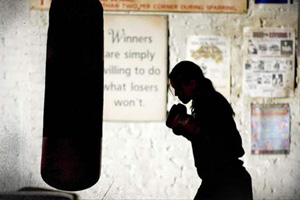 It’s been over five years since Baby came out and as the years pass I think it’s making a pretty decent case for itself as the greatest American film of the last twenty-five years. It’s a terrifically disguised movie because you think you’re getting the female Rocky. And then when it does go tragic, maybe you’re thinking Brian’s Song or Bang The Drum Slowly. But what makes Baby, I feel, a total masterpiece, is that it’s all glued together by blazingly clear and subtle metaphorical writing and directing. Unlike a lot of movies, we are not just watching a story unfold scene by scene. There are like, actual symbols and themes. Every moment has about five layers.
It’s been over five years since Baby came out and as the years pass I think it’s making a pretty decent case for itself as the greatest American film of the last twenty-five years. It’s a terrifically disguised movie because you think you’re getting the female Rocky. And then when it does go tragic, maybe you’re thinking Brian’s Song or Bang The Drum Slowly. But what makes Baby, I feel, a total masterpiece, is that it’s all glued together by blazingly clear and subtle metaphorical writing and directing. Unlike a lot of movies, we are not just watching a story unfold scene by scene. There are like, actual symbols and themes. Every moment has about five layers.
What happened to metaphorical writing? Mumblecore and Neo-neo realism movies don’t bother with it because they’re too concerned with the flatness and ordinariness of everyday reality. There may be political undertones, but that’s as far as it goes. It’s all literal. The new studio films—there’s too many test screenings for anything to be made other than a sad pitch stretched out over 120 minutes. The studio movies are just trailers now—we all know that. Only old lions like Bill Goldman and Paul Schrader bother with metaphor anymore. And the studios don’t really bother with Goldman or Schrader, so…
Here’s the poet W.S. Merwin: “We live the shadow of our lives. What we’re living is metaphor.” Our bodies are representations of the universe, each body telling us a little different information about the galaxy. Our kisses are manifestations of dreams. The world itself is a physical expression of our collective dream. And when you get punched in the face, in the ring, you’re battling storm clouds, ex-lovers, depression, heartbreak, genetics. You get cut? Ask Sylvia Plath about that. She might tell you about the blood issuing from her cut thumb to the running of a million soldiers, “redcoats, every one.”
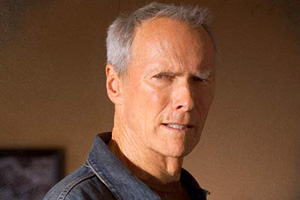 A movie with no metaphor is just a plot where characters do a bunch of shit and then just please run the fucking end credits so I can leave. Go see Indiana Jones and the Kingdom of the Crystal Skull and you get the idea. It’s the desert without lions, orange juice without pulp. It’s about nothing, means nothing. Million Dollar Baby does have a story. But the story is not all that original. The story is no great shakes. What takes it up to the exceptional rank is that every scene is packed with levels of symbols. And you don’t notice this consciously, because Clint is so good. But the movie just starts to work on you. It starts to wear you down without you even knowing what’s happening.
A movie with no metaphor is just a plot where characters do a bunch of shit and then just please run the fucking end credits so I can leave. Go see Indiana Jones and the Kingdom of the Crystal Skull and you get the idea. It’s the desert without lions, orange juice without pulp. It’s about nothing, means nothing. Million Dollar Baby does have a story. But the story is not all that original. The story is no great shakes. What takes it up to the exceptional rank is that every scene is packed with levels of symbols. And you don’t notice this consciously, because Clint is so good. But the movie just starts to work on you. It starts to wear you down without you even knowing what’s happening.
The script was adapted from boxing trainer/writer F.X. Toole’s Rope Burns. And while that book is a great collection of short stories, the credit has to go mostly to Haggis and Eastwood for lassoing it all together into metaphor. Every scene is about vulnerability. Almost every line. It’s a movie about not getting hurt. Or people who did get hurt and are protecting themselves from getting hurt again. Or people who are willing to get hurt to reach for a goal, take that chance.
There are are plenty of great movies about this stuff. Casablanca. The Conversation. But I don’t think I ever saw one as relentless as Million Dollar Baby. That’s all it’s about. Over and over again. Every minute of it. Do you shelter yourself? Will you risk your neck? Will you die? Morgan Freeman has holes in his socks. Clint Eastwood can’t stand it. Can’t stand that Freeman’s toes are exposed. Buy new socks, he tells Freeman. Don’t expose yourself—you might get marred. Every little moment is about this one thing.
“Protect yourself at all times,” Clint’s Frankie repeats again and again to his fighters—the way only a wounded, cautious man would. But as Freeman says, upon hearing of a tough bout refusal by Frankie, “You just protected yourself out of a championship!”
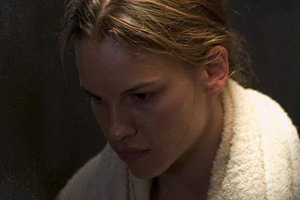 Are you brave? Are you susceptible? Are you always in control? Can you surrender, let go? Will you risk impairment for love? Take on menace to express your truth? In Million Dollar Baby there are monsters and demons everywhere. Not just the crooked fighters in the ring. There are bookies, hoods, ghosts, ghoulish gamblers. And when Swank’s Maggie visits her family and they treat her like trash—then we see what she’s really up against. Herself. Her own self-esteem.
Are you brave? Are you susceptible? Are you always in control? Can you surrender, let go? Will you risk impairment for love? Take on menace to express your truth? In Million Dollar Baby there are monsters and demons everywhere. Not just the crooked fighters in the ring. There are bookies, hoods, ghosts, ghoulish gamblers. And when Swank’s Maggie visits her family and they treat her like trash—then we see what she’s really up against. Herself. Her own self-esteem.
In order to pull this off, Eastwood had to create a world all unto itself. It’s not the ’50s. It’s not the ’90s. It’s not the 2000s. It’s America, certainly. But more than that it takes place in the mind. The mind of Maggie. The mind of Frankie. The mind of Morgan Freeman’s Scrap. And we see these minds made manifest, like W.S. Merwin talked about. The diner that Frankie goes to and has heavenly pie in—that’s not really a diner. That’s a place of grace and loss. The place of losing gracefully. The diner might as well be called dignity. Just like Frankie Dunn’s gym is not a gym so much as a battleground for letting one’s guard down (I know that’s not what boxing gyms are usually known for). People at the gym are scarred. Dunn has lost his daughter’s trust. Something bad happened and he’s been hiding out. But when Maggie comes in, the gym is transformed. It becomes a place of redemption. A place where maybe you can work up the audacity to risk your life again. To risk your heart again.
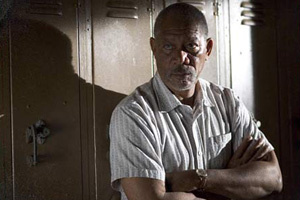 All this might sound like a lot. Like a lot of melodramatic hubbub. But Eastwood’s jazz hand is so steady and cool, the film plays like life. Like life really is—when the curtain lifts. “There’s the magic of risking everything for a dream that nobody sees but you,” Scrap says at one point. And that magic is not glamorous. That magic is not shiny or sparkly. It’s the magic of stealing leftover meat off a table when you’re waiting tables. It’s that lonely magic we all know, when we’re alone, building our dreams, drinking the morning coffee, praying at our bed, riding the bus late at night. We practice this magic, or we fade away and die. “Working the bag, boss.”
All this might sound like a lot. Like a lot of melodramatic hubbub. But Eastwood’s jazz hand is so steady and cool, the film plays like life. Like life really is—when the curtain lifts. “There’s the magic of risking everything for a dream that nobody sees but you,” Scrap says at one point. And that magic is not glamorous. That magic is not shiny or sparkly. It’s the magic of stealing leftover meat off a table when you’re waiting tables. It’s that lonely magic we all know, when we’re alone, building our dreams, drinking the morning coffee, praying at our bed, riding the bus late at night. We practice this magic, or we fade away and die. “Working the bag, boss.”
The music is mostly just fingers on a piano. There’s hardly any color in the whole film. People talk, but they get right to the point and then they leave the room.
On top of all this, it is, in my opinion, the best movie I’ve ever seen about the teacher/student relationship.
FRANKIE
If I take you on–
MAGGIE
I promise I’ll work so hard!
FRANKIE
You don’t question me. And I’m gonna try to forget the fact that you’re a girl.
This goes back to the mind aspect of the film. Because, through training, Maggie and Frankie are going to become one mind. She is not going to be a girl anymore than he is going to be a man. They are going to enter into the place of oneness. The place where their common goal is so strong that it devastates duality, sexuality, individualism.
MAGGIE
You gonna leave me?
FRANKIE
Never.
He gives her the fighting nickname Mo Cuishle.
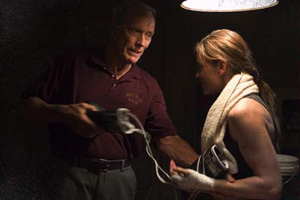 Maggie and Frankie get their shot at the million bucks. A dirty boxer called Blue Bear sucker punches Maggie. Blue Bear, a former prostitute, knows Maggie has too much love and too much uppercut. So Maggie falls onto the corner chair and gets paralyzed from the neck down.
Maggie and Frankie get their shot at the million bucks. A dirty boxer called Blue Bear sucker punches Maggie. Blue Bear, a former prostitute, knows Maggie has too much love and too much uppercut. So Maggie falls onto the corner chair and gets paralyzed from the neck down.
In the next to final scene, Frankie has to go put Maggie to sleep. She’s wasting away in a bloody bed and is begging to be released. He can’t let her go. But he can’t stand to see her in such pain, withering. By holding on and trying to protect her, protect himself, keep them surviving—he is killing them both. And so somehow he gathers himself. And he sneaks into the hospital, in the dark. He goes into his trainer’s bag, takes out a long needle, administers an overdose of adrenaline. He tells Maggie, while injecting her, what the name Mo Cuishle means. It means “My Pulse.”
The characters in this film are not individuals. They’re part of one body. We could probably get into why metaphor has left movies. It’s probably a reflection of society and the vanishing of poetry itself. But that’s another article. This one’s just about putting our hood on, running as fast as we can, and trying our best to knock out The Blue Bear. Maybe we will, or maybe we’ll get killed. But can you kill something that is connected to everything?
In the last scene we see Frankie through a foggy window at the diner that he’s bought. He’s retired from the boxing life. Or at least it looks like Frankie. There are teardrops on the window, it’s hard to see really. The truth is, we don’t know what we’re looking at. A phantasm? And then the movie ends.
— Noah Buschel








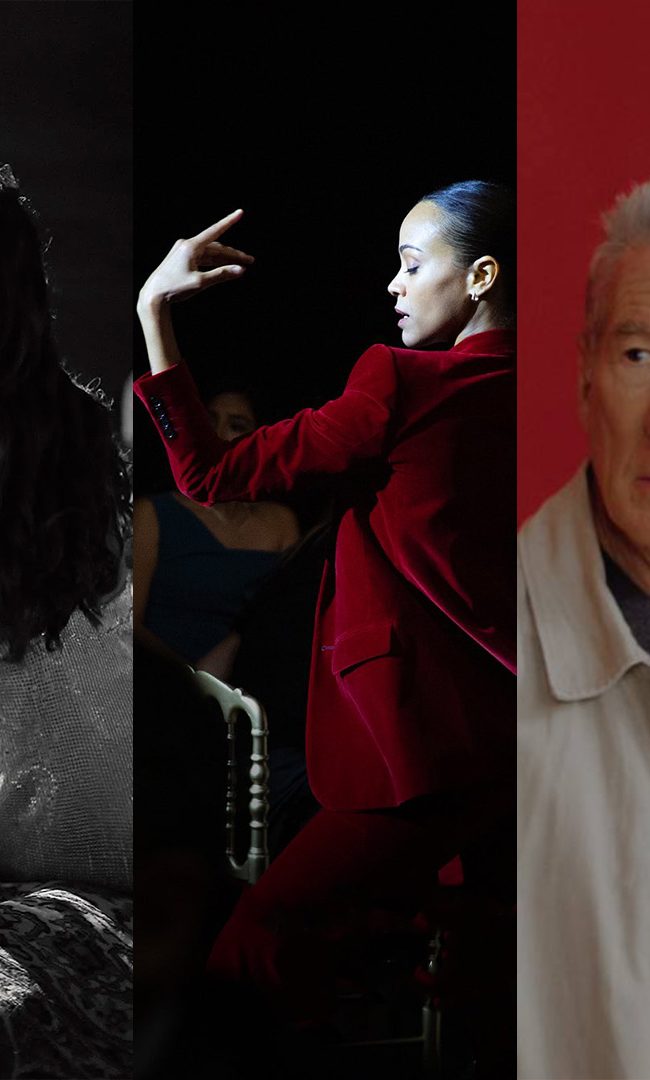



tom
There’s a great interview with Gus Van Sant talking about Last Days where the interviewer asks “is this about the perils of celebrity?” and Van Sant replies, “actually, I think it’s about the Industrial Revolution.” Amazing and, oddly enough, rings true when you watch the film.
Rty
Van Sant sure is cute and hip. Funny, I thought Last Days was mostly just about heroin.
Great article here on Eastwood by Buschel.
Donald Massenburg
Don’t always agree with him, but this man can write!
iNad
Great article, really came to get me, and I mostly agree with you. This is definitely in my top 5 all time favourite movies, no doubt.